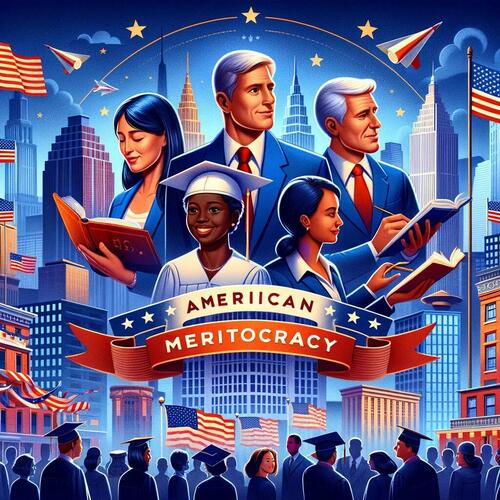We Need A Return To An Emphasis On Meritocracy
Authored by Uldis Sporgis via AmericanThinker.com,
Meritocracy is a system for society in which individuals advance based on their abilities, achievements, and talents.
Leftist DEI or diversity, equity, and inclusion, seeks to erase meritocracy with advancement based on race, gender, economic and social status, handicap, political party, and nepotism.
Meritocracy basically tries to reward those who have worked smart and hard and have earned the reward in their profession and not based on dysfunctional outside criteria such as DEI.
Here are some of the advantages of meritocracy which the leftist elites are shying away from.
-
Meritocracies often place the most qualified individuals in key positions, leading to increased efficiency and productivity as tasks are undertaken by those with the necessary skills and expertise.
-
A meritocratic system encourages innovation as it rewards individuals who bring new ideas, skills, and solutions to the table, fostering a culture of continuous improvement.
-
In theory, meritocracies strive to be fair by providing opportunities based on individual merit rather than factors such as social status, background, or personal connections.
-
Individuals in a meritocratic system are motivated to excel and improve their skills, knowing that their efforts will be recognized and rewarded. This can lead to a more motivated and capable workforce.
-
By allocating resources and responsibilities based on merit, a meritocratic system is more likely to lead to economic growth as qualified individuals contribute to the overall development of society.
-
A well-functioning meritocracy can promote social mobility, allowing individuals to rise to positions based on their abilities, regardless of their background or socioeconomic status.
-
Meritocracies tend to hold individuals accountable for their performance. When success or failure is tied to individual merit, it can lead to a more responsible and accountable society.
-
In a meritocracy, education systems are often designed to identify and nurture talent, ensuring that individuals have the opportunity to develop their skills and abilities to their fullest potential.
-
Meritocratic systems may lead to a more diverse pool of talent in various fields, as individuals from different backgrounds are given the chance to showcase their abilities.
-
A meritocratic system can contribute to public trust and confidence in institutions, as people believe that rewards and opportunities are distributed based on merit, fostering a sense of justice and fairness.
-
Knowing that smart hard work and talent will be recognized and rewarded motivates individuals to perform at their best.
-
A meritocratic system can lead to higher levels of productivity, as individuals are placed in roles that align with their skills and capabilities.
-
Meritocracies aim to provide equal opportunities for everyone, irrespective of their background, promoting a level playing field.
-
Meritocracies often result in leaders who are highly competent and capable, contributing to effective decision making and organizational success.
-
Individuals are encouraged to invest in their professional development, knowing that it will be recognized and contribute to career advancement.
-
Healthy competition among individuals fosters an environment of continuous improvement and excellence.
-
A meritocratic approach can contribute to diversity and inclusion by focusing on individual abilities and qualifications rather than demographic characteristics.
-
Meritocracies can contribute to stability by promoting a sense of justice and fairness in society, reducing resentment and unrest.
-
A meritocratic system is often more adaptable to changing circumstances as individuals with the relevant skills can quickly assume leadership roles.
-
Meritocracies can enhance a country’s global competitiveness by ensuring that the most qualified individuals drive economic and technological progress.
-
Meritocracies aim to minimize favoritism and nepotism, promoting a system where individuals are judged based on their abilities rather than personal connections.
One glaring example of the disastrous policies of DEI is the state of the old Twitter before Elon Musk took over.
What was revealed was a corporation based on censoring ideology in favor of leftist ideas and government collusion. The staff was basically Democratic with a poor work ethic and lack of accountability. Over half the subscribers were fake so the participating audience was dramatically overstated. The stock price of the old Twitter had dramatically decreased indicating that Twitter was in big trouble. Elon Musk may not be able to rehabilitate the old Twitter legacy but it is definitely a foreboding that any organization based on DEI policy is doomed to fail.
While meritocracy has some minor drawbacks which may not always lead to equitable outcomes the advantages far outweigh a DEI approach which is trying to replace the best with the mediocre in society. Let DEI assume dominance and society as we know it is doomed.
Tyler Durden
Wed, 01/03/2024 – 15:40
via ZeroHedge News https://ift.tt/aYyqApK Tyler Durden
